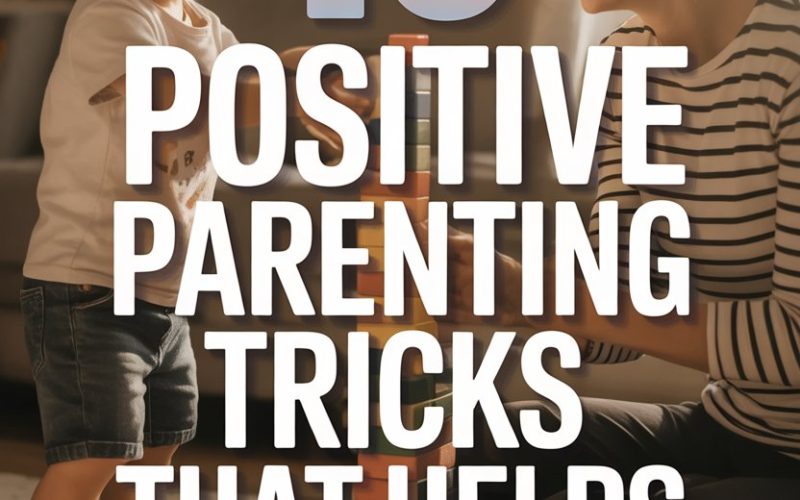Ever wish children came with a user manual? Me too.
While you won’t find one stashed in the nappy aisle, there are tried-and-true strategies that can make life with kids a little less chaotic (and a lot more joyful).
If your days feel like an endless loop of snack requests, lost shoes, and “Why is there toothpaste on the cat again?”, you’re not alone.
Here’s ten parenting tricks that actually help kids shine—even if you’re running on three hours’ sleep and a diet of granola bars.
1. Give Genuine Choices, Not Fake Ones
Ever been offered the “choice” between broccoli or getting grounded? Kids are tiny humans, not hostages at the dinner table.
Providing real choices lets them flex those decision-making muscles early.
Instead of saying, “Do your maths now or else,” try, “Would you like to do your maths before or after your snack?” Kids are far more likely to cooperate when they feel they have a say in the plan.
Studies have shown that children given age-appropriate choices develop greater independence and confidence.
Just don’t go wild with 47 options. Two or three is plenty—unless you enjoy watching a five-year-old spiral into existential crisis over which socks to wear.
2. Praise Effort, Not Just Results
It’s tempting to celebrate only the glittering moments: that A on the test or the goal scored at footy. But growth happens in the messy middle.
Praising effort (“I noticed how hard you worked on your spelling,”) helps kids focus on learning, not just winning.
Carol Dweck’s research on growth mindset shows that children praised for effort show more persistence and resilience when things get tough.
Suddenly, mistakes aren’t terrifying. They’re just pit stops on the road to brilliance.
So, next time your child builds a Lego house that collapses spectacularly, channel your inner coach and cheer on the attempt, not just the outcome.
3. Keep Your Promises (Even Small Ones)
If you say you’ll play trains after tea, suit up for the express.
Consistency tells kids their world is predictable—which is a huge comfort when everything else seems out of control (like the mysterious disappearance of every single left shoe).
Whether it’s promising you’ll tuck them in or that yes, you really will listen to the four-hour monologue on Minecraft, being reliable builds trust.
And if you slip up (because life happens), own it. Kids appreciate a parent who says, “I forgot, and I’m sorry,” far more than a creative excuse involving imaginary traffic jams.
4. Model the Behaviour You Want to See
You know that heartwarming moment when your child kindly shares a biscuit with a friend?
Yeah, they learned that from you—possibly in one of your finer moments, not the time you finished the last piece of chocolate and blamed the dog.
Kids are world-class mimics. If you want them to use their “inside voice”, handle frustration calmly, or tidy up after themselves, show them how by doing it yourself.
The old “do as I say, not as I do” routine only works until about age three… if you’re lucky.
Experts confirm that parents are children’s most important role models. So yes, you really do have to say thanks when someone hands you your phone from under the couch.
5. Make Connection a Daily Ritual
Connection doesn’t mean elaborate outings or winning Parent of the Year. It can be as simple as five uninterrupted minutes after school: no phone, no work emails, just you and your child.
Small rituals—a bedtime story, a silly handshake, tea parties with stuffed animals—help kids feel seen and valued.
Research published in the Harvard Gazette shows that even brief moments of parental warmth and attention fuel emotional health.
Busy day? Even a quick cuddle while microwaving dinner does the trick. Bonus points if you can keep the peas from exploding.
6. Set Clear but Flexible Boundaries
Children thrive when they know the rules—and which ones are written in crayon. Boundaries are your family’s guardrails, not a set of handcuffs.
Be clear: “Bedtime’s at 8.” Be flexible when it matters: “But tonight, we’ll keep the light on because the thunder’s a bit scary.”
Boundaries with a dash of empathy teach kids that safety and compassion can coexist.
Kids will test the limits (it’s practically their job description). Stay calm, stand firm on what matters, and let minor stuff slide when you can.
The American Academy of Pediatrics recommends positive, consistent limits over harsh discipline.
7. Use Play to Solve Problems
Ever tried reasoning with a toddler mid-tantrum? Might as well negotiate with a squirrel. But turn a problem into a game, and suddenly you’re both winning.
Late for school? “Let’s see who can get their shoes on first—ready, set, go!” Reluctant to brush teeth? Cue the silly toothbrushing song.
Play lowers defences, diffuses tension, and engages your child’s imagination.
Even older kids respond to a bit of fun—think “Who can clear the table fastest?” or “Let’s speak only in pirate voices until the car’s unpacked.”
Child development experts agree that play is serious business when it comes to learning cooperation, empathy, and problem-solving.
8. Teach Emotional Vocabulary
Ever had a small person scream, “I’M NOT MAD!” while hurling a shoe? Emotional literacy is a lifelong gift, and it starts with words.
Help your child name their feelings: “Looks like you’re feeling frustrated because your tower fell.”
Labelling emotions takes the spooky power out of big feelings, and gives kids a toolkit for handling them.
A study by the University of Washington found that children who can identify and express feelings are better equipped to manage conflict and bounce back from disappointment.
And when your own fuse burns short, model that too: “I’m feeling a bit overwhelmed—I’m going to take a breath.” They’ll catch on. Eventually.
9. Say Sorry (And Mean It)
Ever noticed how apologies taste like humble pie, especially when you’re parenting? Still, showing your child how to own up gracefully is one of the greatest gifts you can give.
“I yelled when I was frustrated. That wasn’t fair to you. I’m sorry.” No excuses, no lectures. Just a simple, sincere apology.
Kids learn that even grown-ups mess up, and that saying sorry doesn’t shrink you—it strengthens your relationships.
Psychologists have found that parents who apologise raise children who are more compassionate and responsible.
Pro tip: Apologies work best when followed by a hug and maybe a biscuit. For both of you.
10. Celebrate Progress, Not Perfection
There’s a myth that good parents have kids who always say please, never whinge, and tidy their rooms without being asked. If you’ve met one of these mythical creatures, do let me know.
Real children (and real grown-ups) are works in progress.
Celebrate tiny victories: the ten-minute truce between siblings, the first time your child puts on their shoes without a search party, the moment they say “sorry” without prompting.
Perfection is overrated. Progress is where the magic happens.
As child psychologist Dr. Laura Markham puts it, “When you notice and appreciate growth, you inspire more of it.”
So, next time you catch your child being kind, responsible, or just plain themselves, let them know you saw it. Even if there’s still toothpaste on the cat.
Raising Happy, Resilient Kids (And Surviving the Ride)
Parenting isn’t about arriving at some mythical destination called “having it all together.” It’s about showing up, loving hard, and laughing (or at least snorting) through the mess.
These positive parenting tricks are about progress—for your kids and for you.
Tonight, try one or two. See what happens.
Maybe bedtime goes ten minutes smoother. Maybe you get an extra cuddle. Maybe someone else cleans the toothpaste off the cat.
That’s a win worth celebrating.





